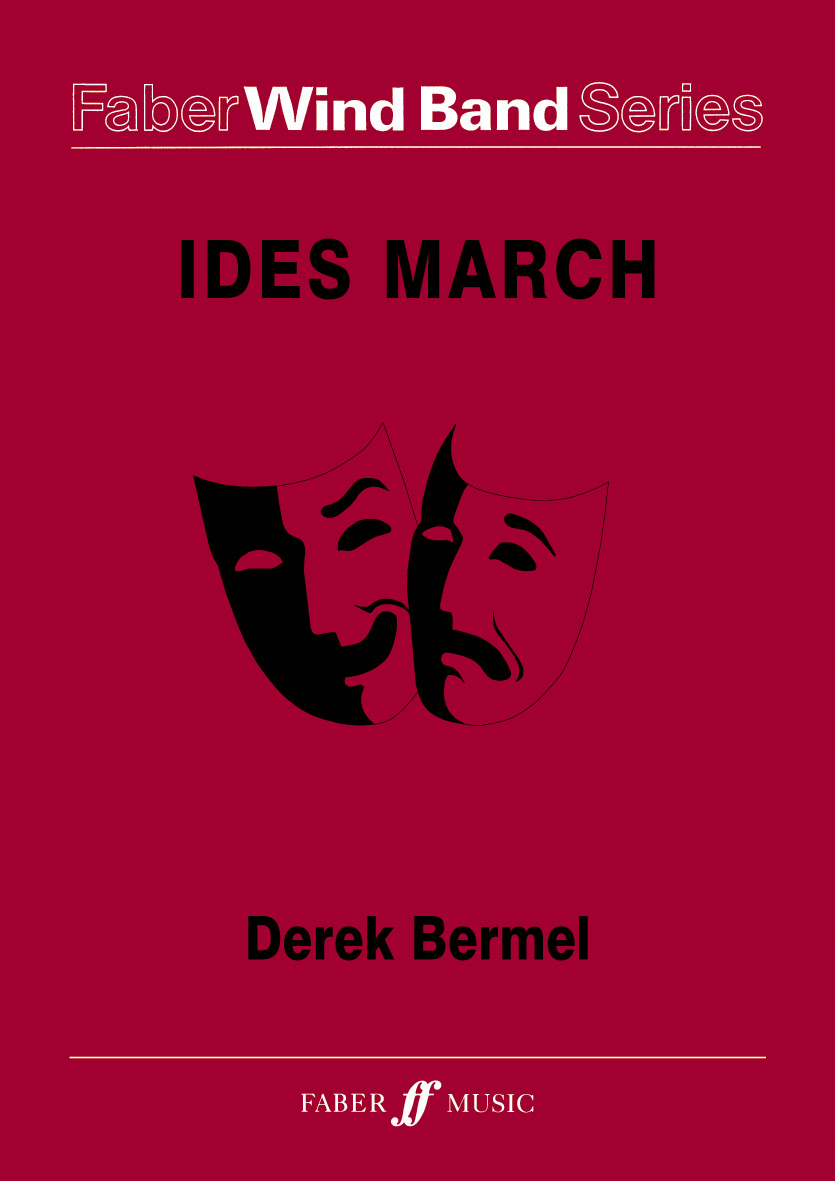Results
-
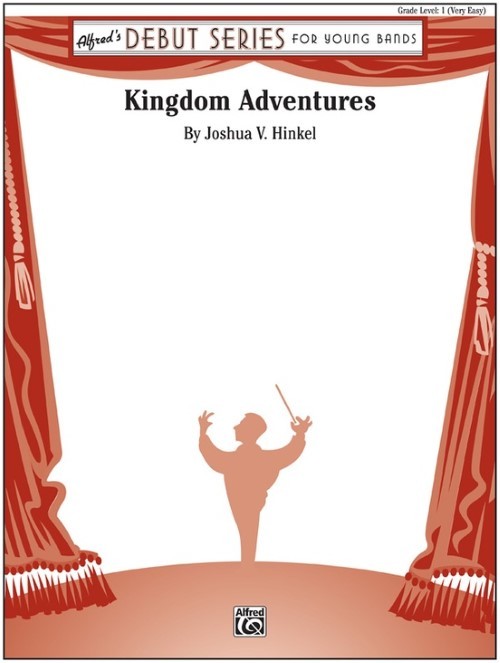 £41.50
£41.50Kingdom Adventures (Concert Band - Score and Parts) - Hinkel, Joshua
We can all recall family adventures and outings throughout our childhood that led us to enchanting and magical places where the impossible came to life and reality seemed like only a distant memory. Kingdom Adventures is an exciting composition that portrays the youthful spirit of exploring a magical kingdom, and reminds us of the careless wonders and experiences that highlight the memories of childhood. As you enter the kingdom, the majestic walls protect the stoic castle that stands in the midst of the kingdom. Inside the castle, every twist and turn of the castle's hallways offers the possibility of something amazingly new and exciting. One cannot help but to be transported into another place and time as they experience all that the magical kingdom has to offer!Duration: 2.15
Estimated dispatch 7-14 working days
-
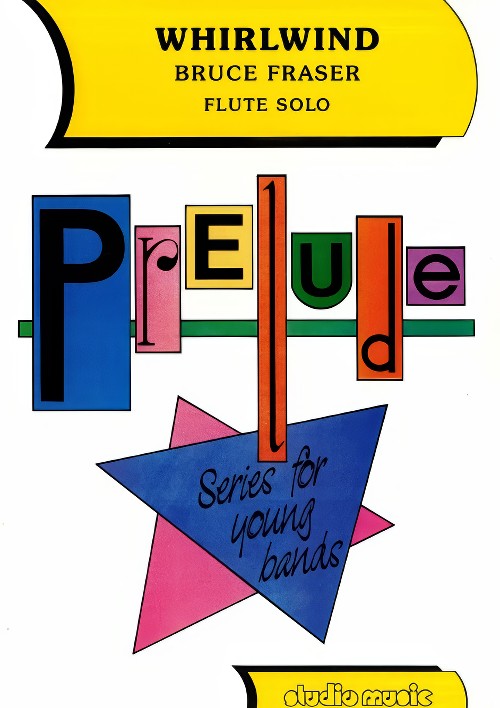 £44.95
£44.95Whirlwind (Flute Solo with Concert Band - Score and Parts) - Fraser, Bruce
Whirlwind is a flute solo and (despite the title!) it will be found that a steady waltz tempo works best. Obviously, it is important that the accompaniment remains delicate and that dynamics are adhered to.Titles in the Prelude Series are specifically scored for bands with few, if any, bass instruments but will sound well on larger ensembles. The bass line is playable by any combination of bass clarinet, bassoon, baritone saxophone, trombone, euphonium or tuba; in the event that none of these is available, the part for trombone/euphonium (B flat TC) can be played by tenor saxophone. The tuned percussion part is entirely optional and can be played by any available instrument(s). Each piece also includes a preliminary exercise. This is always in the same key as the accompanying piece and consists of a scale and chord progression that can be used for improving ensemble, balance, intonation and instrumental facility by changing tempo, articulation and dynamics.Duration: 1.30
Estimated dispatch 7-14 working days
-
 £77.22
£77.22In The Presence of Heroes
This exciting composition contains all the musical elements that you would want your ensemble to experience. A wonderful and moving tribute to our everyday heroes serves as the backdrop for this creative endeavor. The perfect combination of story and music results in a variety of musical settings that are masterfully scored to provide a quality of sound that is both impacting and, at times, highly delicate. It should be noted that a lush heroic theme is interwoven throughout the piece that will undoubtedly inspire members of the audience to sing to themselves as they leave the concert hall. Inspiring!
Estimated dispatch 7-14 working days
-
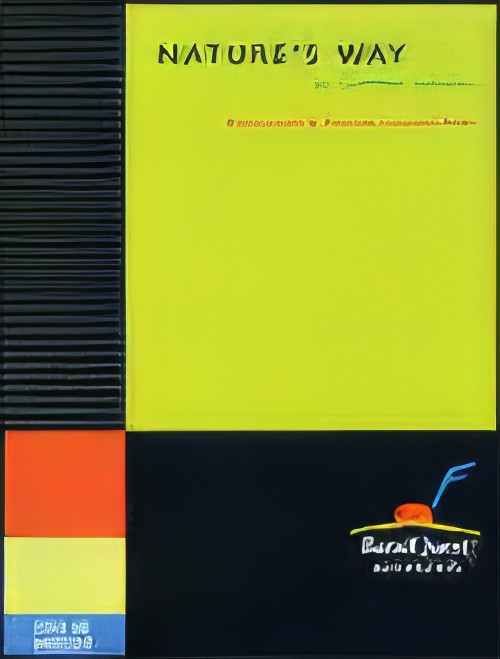 £72.99
£72.99NATURE'S WAY (BandQuest) - Schuller, Gunther
From the composer: "Nature's Way for intermediate level band was commissioned by BandQuest, a project initiated by the American Composers Forum. Their mission is for major composers of national reputation to write works of high quality that take into consideration the (still comparatively limited) levels of musical development--both technical and conceptual--typical of such ensembles. I eagerly accepted the commission and the challenges implied thereby--that is, to reign in my creative imagination to some extent and limit the technical/conceptual demands to a more moderate level than is to be found in my previous compositions for band. Nonetheless, since the process of rehearsing, studying and performing a work created specifically for the school student market is--and must be, in my view--primarily educational, it was very clear to me that my work would (and should) challenge the players at least to their top levels, and even a little beyond that. Thus Nature's Way in no way represents a compromise of my personal style, nor my long held concepts of form, continuity, texture, and instrumentation. I have known for a long time that young, inquisitive minds are eager to learn from new experiences, from previously never encountered challenges, that is to say, to be pushed--gently--to rise above their present levels of achievement. That's what education is all about."
Estimated dispatch 7-14 working days
-
 £102.99
£102.99Noel Wind Band Set (Score & Parts)
Noel" is based on the famous English Carol "The First Noel". The age of this song is not clear.Some scientists argue that tis song is from early thirteenth century, others say that it's from the sixteenth century.The first publication was in 'Christmas Carols, Ancient and Modern', compiled by William B. Sandys. (London, 1833).The exact origin is unknown. By Norman influences on the text, with the result that the spelling of the song is not certified (Noel, Nowell), an individual will sometimes claim that France is the cradle of this song, but in general assumes that "the First Noel 'for the first time somewhere in England sung. 03:45
Estimated dispatch 7-14 working days
-
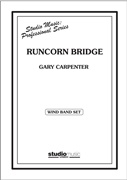 £174.95
£174.95RUNCORN BRIDGE (Professional Concert Band - Score and Parts) - Carpenter, Gary
The through-arch bridge that is visible for miles across the Cheshire Gap is one of two adjacent bridges that cross both the River Mersey and Manchester Ship Canal. Its formal name is the Silver Jubilee Bridge is more usually known as the Runcorn Bridge. Runcorn Bridge begins with a brief, quiet, introduction featuring an oboe solo. There follows a lively march at the end of which a reflective interlude (or bridge!) based upon the tune that occurs twice in the march leads to a lyrical, almost nocturnal section spotlighting the alto saxophone. A variant of the first interlude leads to a scherzo-like section kicked off by the euphonium with a 'trio' that contains a Latin-inflected version of the oboe melody first heard in the introduction. A third interlude variant heralds a return of the nocturnal melody firstly as a horn solo but subsequently returning to the alto saxophone. Previous melodic materials gradually combine as an extended crescendo leads to a majestic, but short, coda that in a gesture of symmetrical solidarity refers back to the march tune utilised in the earlier interludes. Duration: 10:30. Recorded on Polyphonic QPRM160D Bells Across the Atlantic.
Estimated dispatch 7-14 working days
-
 £37.95
£37.95RUNCORN BRIDGE (Professional Concert Band - Score only) - Carpenter, Gary
The through-arch bridge that is visible for miles across the Cheshire Gap is one of two adjacent bridges that cross both the River Mersey and Manchester Ship Canal. Its formal name is the Silver Jubilee Bridge is more usually known as the Runcorn Bridge. Runcorn Bridge begins with a brief, quiet, introduction featuring an oboe solo. There follows a lively march at the end of which a reflective interlude (or bridge!) based upon the tune that occurs twice in the march leads to a lyrical, almost nocturnal section spotlighting the alto saxophone. A variant of the first interlude leads to a scherzo-like section kicked off by the euphonium with a 'trio' that contains a Latin-inflected version of the oboe melody first heard in the introduction. A third interlude variant heralds a return of the nocturnal melody firstly as a horn solo but subsequently returning to the alto saxophone. Previous melodic materials gradually combine as an extended crescendo leads to a majestic, but short, coda that in a gesture of symmetrical solidarity refers back to the march tune utilised in the earlier interludes. Duration: 10:30. Recorded on Polyphonic QPRM160D Bells Across the Atlantic.
Estimated dispatch 7-14 working days
-
£69.95
Toccata - Score and Parts - Wilfred Heaton
Program NotesToccata - Oh the blessed Lord was first conceived as a brass sextet and remained in that form until the early 1970s when it was amplified to full brass band instrumentation. Now its further amplification to Wind Band it is hoped that it will be enjoyed by an even greater audience and many more performers.Whilst it is not easy to play, the music, once mastered, is something that bands enjoy. It will be evident to the discerning that this close-knit work is based on the verse of an adaption of the old spiritual, "Oh, dem golden slippers," the text beginning, "Oh the blessed Lord, He has saved my soul." The figures are derived therefrom.The absence of percussion is the express intention of the composer.
Estimated dispatch 7-14 working days
-
£13.95
Toccata - Score only - Wilfred Heaton
Program NotesToccata - Oh the blessed Lord was first conceived as a brass sextet and remained in that form until the early 1970s when it was amplified to full brass band instrumentation. Now its further amplification to Wind Band it is hoped that it will be enjoyed by an even greater audience and many more performers.Whilst it is not easy to play, the music, once mastered, is something that bands enjoy. It will be evident to the discerning that this close-knit work is based on the verse of an adaption of the old spiritual, "Oh, dem golden slippers," the text beginning, "Oh the blessed Lord, He has saved my soul." The figures are derived therefrom.The absence of percussion is the express intention of the composer.
Estimated dispatch 7-14 working days
-
£55.00
Ides March (Score & Parts) - Derek Bermel
Ides March was commissioned by William Brine in 1990, Bermel's first commission. Brine requested that the work be a march suitable for performance at both a wedding and a funeral. Although originally titled Brine's March, when the composer learned that the march was to receive its premiere on 15 March, he changed the title to Ides March in a umorous nod to the Shakespearean admonition 'Beware the Ides of March'; in his youthful view a sentiment appropriate for either a wedding or a funeral. However, a line from Cole Porter was the inspiration behind the major key to minor key interplay of the work: 'What could be any finer? But how strange the change from major to minor, every time we say goodbye', a line that captured the composer's attempt to write a march that did justice to both the melancholy and triumphant.
In stock: Estimated delivery 1-3 days

